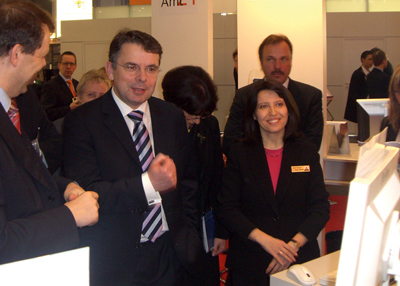The analysis of safety-critical and business-critical software and systems is the core topic of the ERCIM Working Group on Formal Methods for Industrial Critical Systems (FMICS). Accurate mathematical analysis of industrial systems is greatly supported and simplified with the help of computers. In spite of the use of advanced technology, extensive and error-prone software adaptations are required for the development of new programs and processes, and even the implementation of small changes and adaptations. This mandates extensive validation and testing which must be delegated to programming experts: a costly detour in terms of precious time and absorbed capacity, and a threat to the fast responses demanded by market competitiveness.
FMICS promotes the development and the fast industrial adoption of precise and efficient automated analysis methods. These can help businesses govern their software, harness their risks, and in this way improve their software products. But once the analysis algorithms and tools are there, how can they best be used, customized or combined? Efficient, targeted analyses nearly always require complex combinations of heterogeneous algorithms and transformations, and without a community that shares its knowledge and tools as services; without a repository that knows where such algorithms are available and what capabilities they offer; without a platform that supports the simple, intuitive composition of problem-specific analyses that are immediately executable; the potential user is lost.
The FMICS-jETI framework developed at the Chair of Service and Software Engineering in Potsdam and the Chair of Programming Systems in Dortmund consistently addresses users' individual needs within a service-oriented paradigm. With FMICS-jETI, end-users become active 'prosumers': they are empowered to collect in a flexible way the complex algorithms and analyses they need, to publish them as providers to the community or to the Web, and as users to reassemble them at any time, as they need and without any programming.
Enabling technology relies on the service-oriented modelling framework jABC. With the aid of jABC, not only engineers, but also biologists, statisticians and other non-IT personnel can immediately use existing analysis processes in a push-button fashion, and can even easily and graphically define and modify them on their own.
What works locally at the workplace (analysis components, databases etc) can also be remotely accessed anywhere and at any time using the jETI technology, so that the playground essentially spans the Web!
Proof that the methodology and platforms are robust for much wider interdisciplinary adoption is given by Bio-jETI, FMICS-jETIs sister platform that targets bioinformatics processes in the context of the Center of Applied Proteomics (ZAP). Bio-jETI's goal and emphasis are characterized by the following corresponding project summary.
In the future, research will become more efficient and economical through the use of process-based technology for quantitative protein analysis. Pharmaceutical businesses will for example be able to carry out the analysis of proteomes faster and more on target than is currently possible.

The ZAP bundles the interdisciplinary skills needed to develop such technology in the areas of proteomics, bioinformatics, biostatistics, glycoanalysis and protein-biochips. The Chair of Programming Systems at the Universität Dortmund (Prof. Bernhard Steffen, also an FMICS affiliate) is a scientific partner in ZAPs bioinformatics project. "Statistical evaluations of biological experiments are simplified with the help of computers. However, even minor changes in the software still require programming experts. Up to now, too much effort and time is spent for software adaptation", says Bernhard Steffen.
With the Bio-jETI framework developed at the Chair of Programming Systems in Dortmund, biologists can flexibly collect the complex processes they require, and reassemble them at any time and without any programming. Additionally, researchers are able to share their data and analysis processes worldwide with other research groups or industrial partners.
The benefits and suitability of Bio-jETI for biostatistical analyses were demonstrated at CeBIT 2007 and BIOTECHNICA 2007 in Hannover, Germany.
Links:
http://jeti.cs.uni-dortmund.de/fmics
http://jeti.cs.uni-dortmund.de/biojeti
http://jabc.cs.uni-dortmund.de
Please contact:
Tiziana Margaria-Steffen,
University Potsdam, Germany
Tel: +49 331 9773040
E-mail: margaria![]() cs.uni-potsdam.de
cs.uni-potsdam.de
Bernhard Steffen
Technical University Dortmund,
Germany
Tel: +49 231 755 5801
E-mail: steffen![]() cs.tu-dortmund.de
cs.tu-dortmund.de









